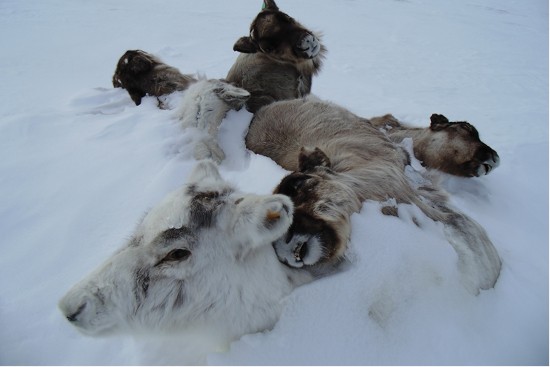By Ana Verayo, | November 16, 2016

Loss of sea ice and extreme weather is leading to reindeer deaths in the Arctic. (Roma Serotetto/Arctic Centre University of Lapland)
Almost 100,000 reindeer starved to death between 2006 and 2013 along the Arctic Circle in Russia. Scientists have linked this tragic event to unpredictable weather patterns caused by global warming. In 2006, 20,000 reindeer perished, and in 2013, 61,000 reindeer froze to death.
Like Us on Facebook
Scientists found that this environmental disaster was caused by retreating sea ice due to warmer temperatures and heavier rains which have frozen the snow cover for months. This cut off the food supply of reindeer.
According to Bruce Forbes from the University of Lapland in Finland, reindeer are used to sporadic ice cover. Adult males can physically break through and smash this ice if it is around two centimeters thick. However, in 2006 and 2013 the ice cover was more than 70 centimeters thick, making it impossible for them to gain passage.
This year, September yielded the second lowest sea ice cover ever record in the Arctic region.
Forbes explains that if such an event were to happen again this year, it means that there is a pattern and these famines are becoming more frequent. This will be a major problem for local reindeer herders who are still recovering from their losses in 2013.
After a summer thaw, seasonal ice in the Arctic usually builds up in November. However, in 2006 and 2013, ice in the Barents and Kara seas in the Yamal peninsula began retreating in early November. This decrease in sea ice cover can cause more evaporation and humidity in the region, and combined with warmer air temperatures, this can lead to more rain clouds.
Indigenous Yamal Nenet herders led their reindeer into south when winds blow these rain clouds. After massive pouring rain for 24 hours, the snow in the region became soaking wet turning snow cover into mush.
Temperatures then dipped into negative 40 degrees for winter, and this water turned snow cover into an impenetrable solid wall of ice for months, preventing reindeer from foraging and feeding.
In 2013, 61,000 reindeer starved to their death in the peninsula, leading to a loss 22 percent of entire reindeer population in the Arctic Circle.
This new study was published in the journal, Biology Letters.
-
Use of Coronavirus Pandemic Drones Raises Privacy Concerns: Drones Spread Fear, Local Officials Say

-
Coronavirus Hampers The Delivery Of Lockheed Martin F-35 Stealth Fighters For 2020

-
Instagram Speeds Up Plans to Add Account Memorialization Feature Due to COVID-19 Deaths

-
NASA: Perseverance Plans to Bring 'Mars Rock' to Earth in 2031

-
600 Dead And 3,000 In The Hospital as Iranians Believed Drinking High-Concentrations of Alcohol Can Cure The Coronavirus

-
600 Dead And 3,000 In The Hospital as Iranians Believed Drinking High-Concentrations of Alcohol Can Cure The Coronavirus

-
COVID-19: Doctors, Nurses Use Virtual Reality to Learn New Skills in Treating Coronavirus Patients







